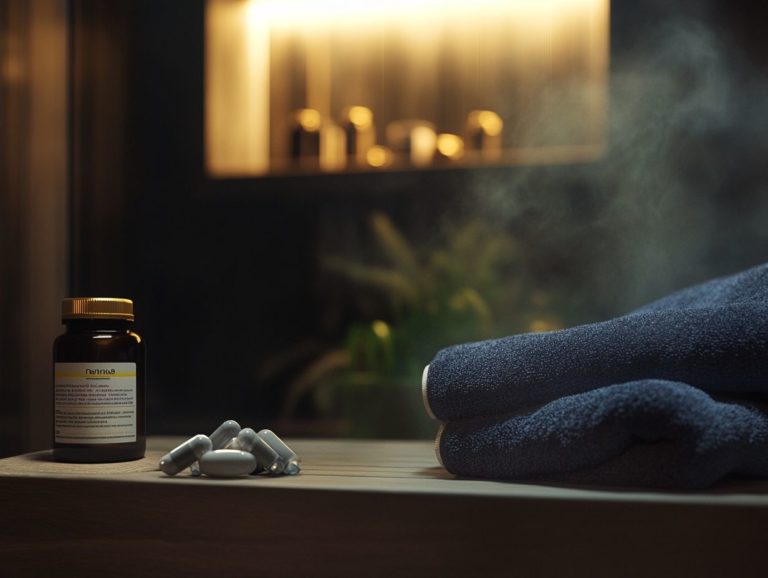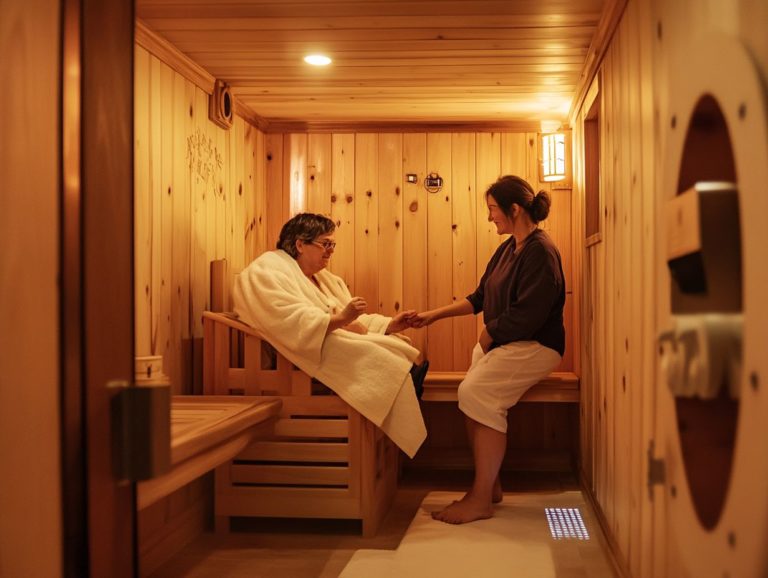What is Aromatherapy and Its Benefits?
Aromatherapy taps into the powerful benefits of essential oils to enhance physical and mental well-being. It offers a holistic approach to health that resonates deeply.
Originating from ancient cultures, this practice has evolved, blending time-honored traditions with modern insights.
In this article, you will explore aromatherapy, discover how it works, and learn about the numerous benefits it provides for mood and emotions.
You will also find guidance on selecting and safely using essential oils, enabling you to incorporate this natural therapy into your life.
Contents
Key Takeaways:
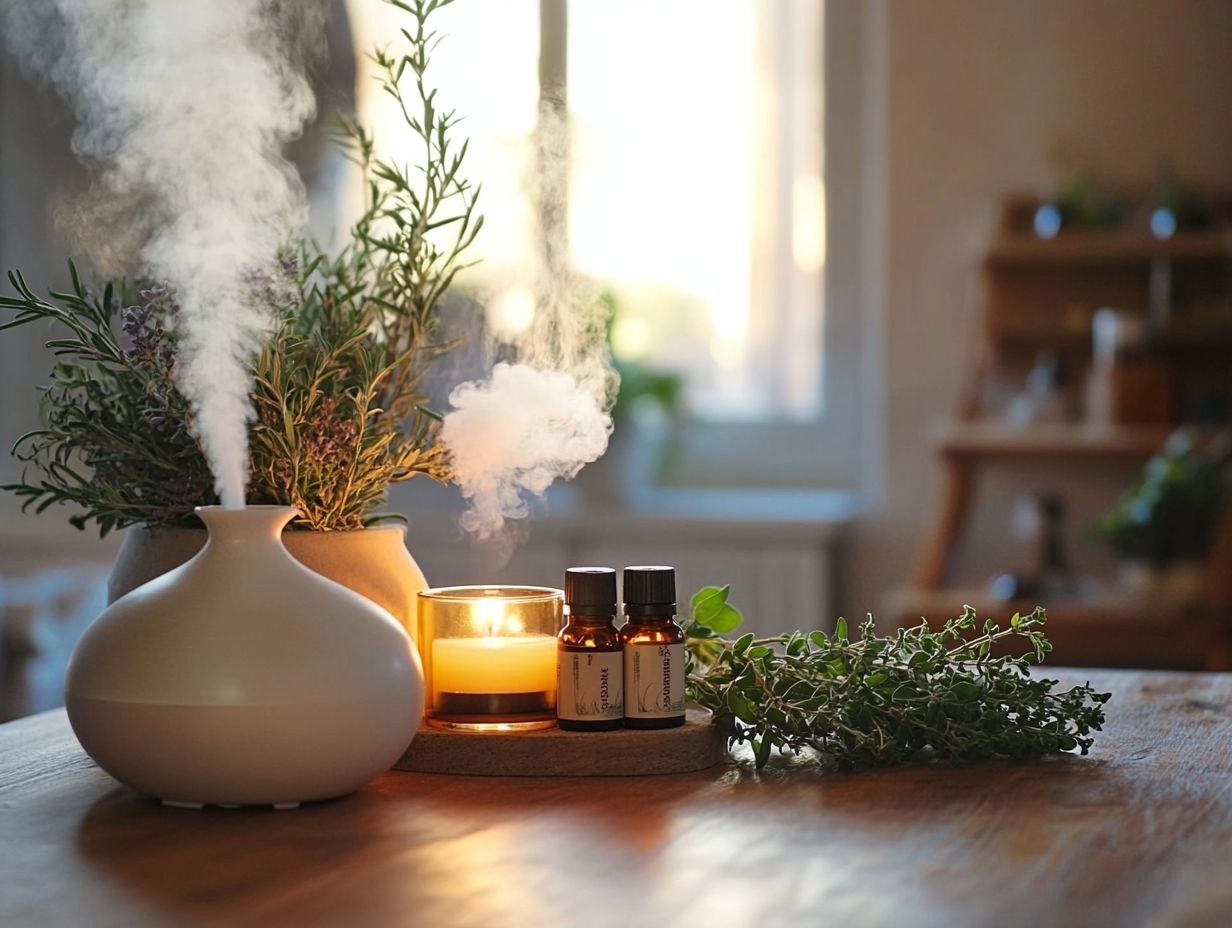
- Aromatherapy uses essential oils to promote physical, mental, and emotional well-being.
- Essential oils have been used for centuries across various cultures and offer diverse benefits for the mind and body.
- Carefully choose and use essential oils, considering factors like purity and safety.
What is Aromatherapy?
Aromatherapy is a natural healing method that allows you to harness the therapeutic benefits of essential oils derived from plants. These oils aim to enhance your health and overall quality of life.
With applications ranging from skin use to inhalation techniques, aromatherapy can elevate your mood, relieve stress, and alleviate anxiety. It’s a popular natural remedy for both physical and mental health concerns.
This practice promotes relaxation and nurtures emotional well-being by utilizing the essence of specific essential oils. For instance, lavender is known for its calming effects, while eucalyptus supports respiratory health and rejuvenation.
You can explore techniques such as diffusers, massage oils, or indulgent baths to seamlessly integrate essential oil therapy into your daily routine.
The health benefits are extensive, with many individuals finding relief from chronic pain and insomnia through targeted applications. Ultimately, aromatherapy encourages a deeper connection with your body, fostering balance and harmony essential for healing.
Brief History and Cultural Significance
The history of aromatherapy spans thousands of years. Ancient civilizations utilized plant extracts for both medicinal and spiritual purposes, significantly influencing various cultures and health practices.
In the early 20th century, French chemist Ren -Maurice Gattefoss coined the term ‘aromatherapy,’ emphasizing the role of essential oils in holistic therapy and leading to recognition by the International Standards Organization.
As early as 3000 BC, Egyptians harnessed scents for religious rituals and embalming, while Greeks and Romans integrated aromatic plants into their baths and remedies. Over time, this practice intertwined with healing traditions from the East, such as Ayurveda and Traditional Chinese Medicine.
Today, aromatherapy is a mainstream wellness approach that champions relaxation, stress relief, and mental clarity.
Its cultural relevance continues to grow, with an increasing number of wellness centers and spas embracing aromatherapy techniques, reflecting a collective return to natural healing methods.
How Aromatherapy Works
Aromatherapy operates through the inhalation or application of essential oils, which penetrate the skin or enter your bloodstream. This process engages the part of the brain that controls emotions, creating a remarkable interaction between chemical compounds and your emotional and physiological responses.
These interactions facilitate relaxation and stress relief while enhancing mental health by boosting serotonin production and improving cognitive function, ultimately leading to better sleep and a higher overall quality of life.
Conclusion
Aromatherapy offers a unique way to enhance physical and mental well-being through the use of essential oils. By understanding its benefits and learning how to use essential oils safely, you can unlock a powerful tool for natural healing in your life.
Understanding Essential Oils
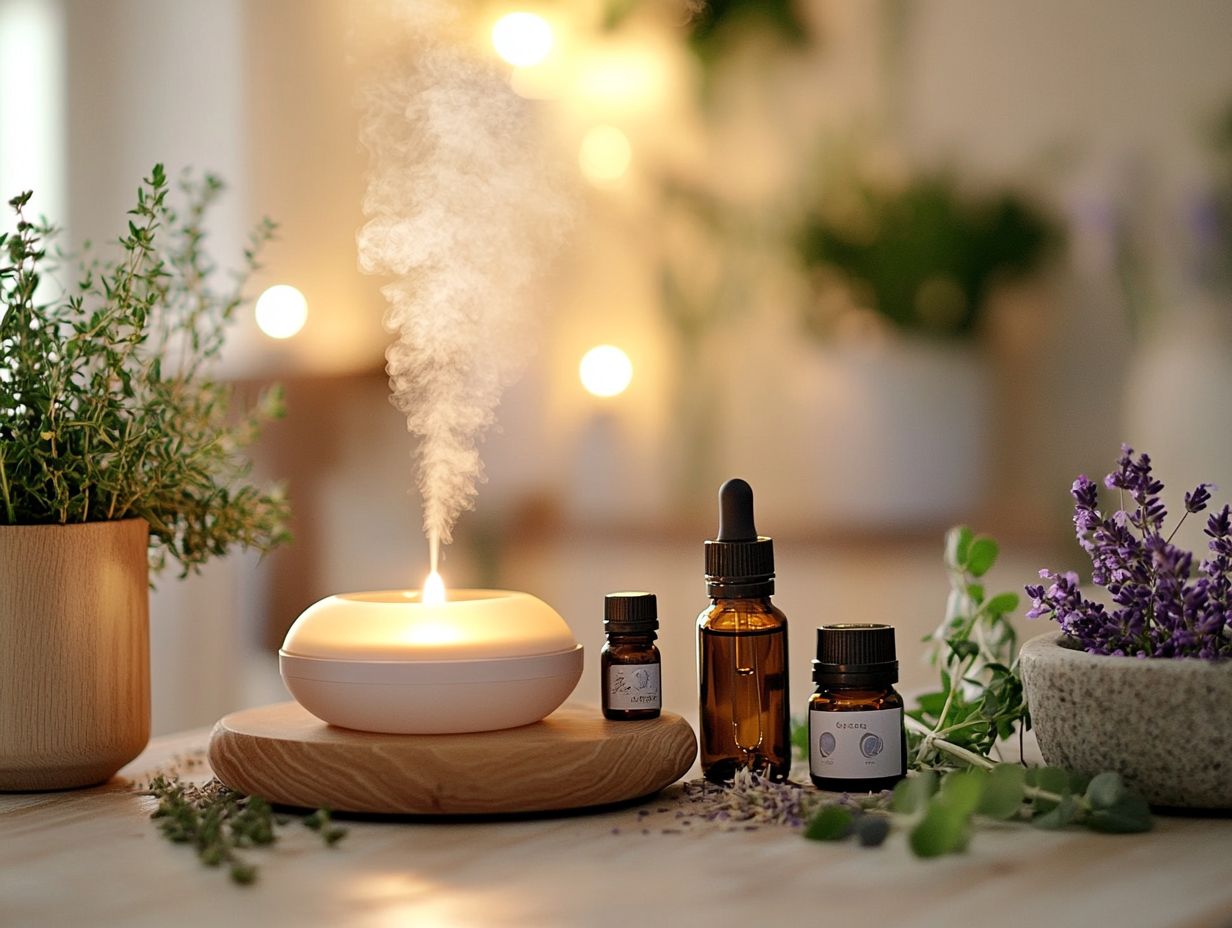
Essential oils are concentrated plant extracts that capture the natural fragrance and therapeutic benefits of various botanicals. You probably know the delightful effects of popular oils like lavender, eucalyptus, and peppermint, each celebrated for their unique chemical compounds that help alleviate anxiety, promote relaxation, and offer physical health benefits such as respiratory disinfection and pain management.
These oils are typically obtained through methods like steam distillation (a method to extract oil from plants using steam), cold pressing, or solvent extraction. Each technique influences the purity and quality of the final product. For example, lavender essential oil, famous for its calming effects, contains linalool and linalyl acetate compounds that actively contribute to its soothing influence on both mind and body. Eucalyptus oil, renowned for its elevated levels of cineole, can clear nasal congestion and facilitate easier breathing.
By understanding these extraction methods and the specific benefits of each oil, you can confidently select the essential oils that best suit your holistic health needs.
Methods of Aromatherapy
Aromatherapy offers a wealth of methods for you to explore, such as skin application, inhalation, and the enjoyment of massage oils. This allows you to tailor your experience and target specific health benefits effectively. Incorporating techniques like breathing exercises and relaxation methods can enhance the effectiveness of aromatherapy, making it a versatile companion for stress relief and mood enhancement.
When you apply essential oils to your skin, remember to dilute them with a neutral oil (used to dilute essential oils) to create luxurious blends that nourish and rejuvenate while delivering therapeutic benefits. Imagine a soothing lavender oil infused with sweet almond oil, gently applied to your pulse points, promoting a sense of relaxation that envelops you.
Consider the ritual of bathing; adding essential oils like eucalyptus or chamomile transforms your bath into a serene oasis, opening your airways and enhancing your breathing. The use of massage oils, enriched with calming scents, can elevate your relaxation, allowing your body to release tension effortlessly.
By integrating these relaxation techniques and breathing exercises, you create a holistic experience that nurtures both your body and mind.
Benefits of Aromatherapy
- Improved sleep
- Relief from anxiety
- Enhanced mood
- Holistic healing
- Pain management
The benefits of aromatherapy are extensive, making it an essential component of wellness. Research indicates that essential oils can significantly aid in pain management and support mental health, while also providing therapeutic advantages such as respiratory disinfection. These contributions elevate your quality of life.
Physical and Mental Health Benefits
Aromatherapy presents a treasure trove of physical and mental health benefits. Essential oils like lavender, chamomile, and cedarwood are champions of relaxation and emotional well-being. The therapeutic properties of these oils can effectively alleviate symptoms of anxiety and depression, support pain management, and elevate your overall quality of life.
For instance, lavender oil is celebrated for its calming effects. You can use it in a diffuser or add a few drops to your bath; it works wonders in reducing stress levels and enhancing sleep quality. Chamomile, with its delightful scent, can ease anxiety while promoting tranquility. Cedarwood oil boasts grounding properties that can help you navigate emotional turmoil, making it an invaluable ally during stressful times.
Incorporating these essential oils into your daily routine sharpens mental clarity and bolsters physical health by reducing chronic pain and boosting your immune system. This commitment to wellness fosters a holistic approach that nurtures both mind and body.
Have you tried using essential oils for relaxation? Discover the soothing power of lavender oil today!
Effects on Mood and Emotions
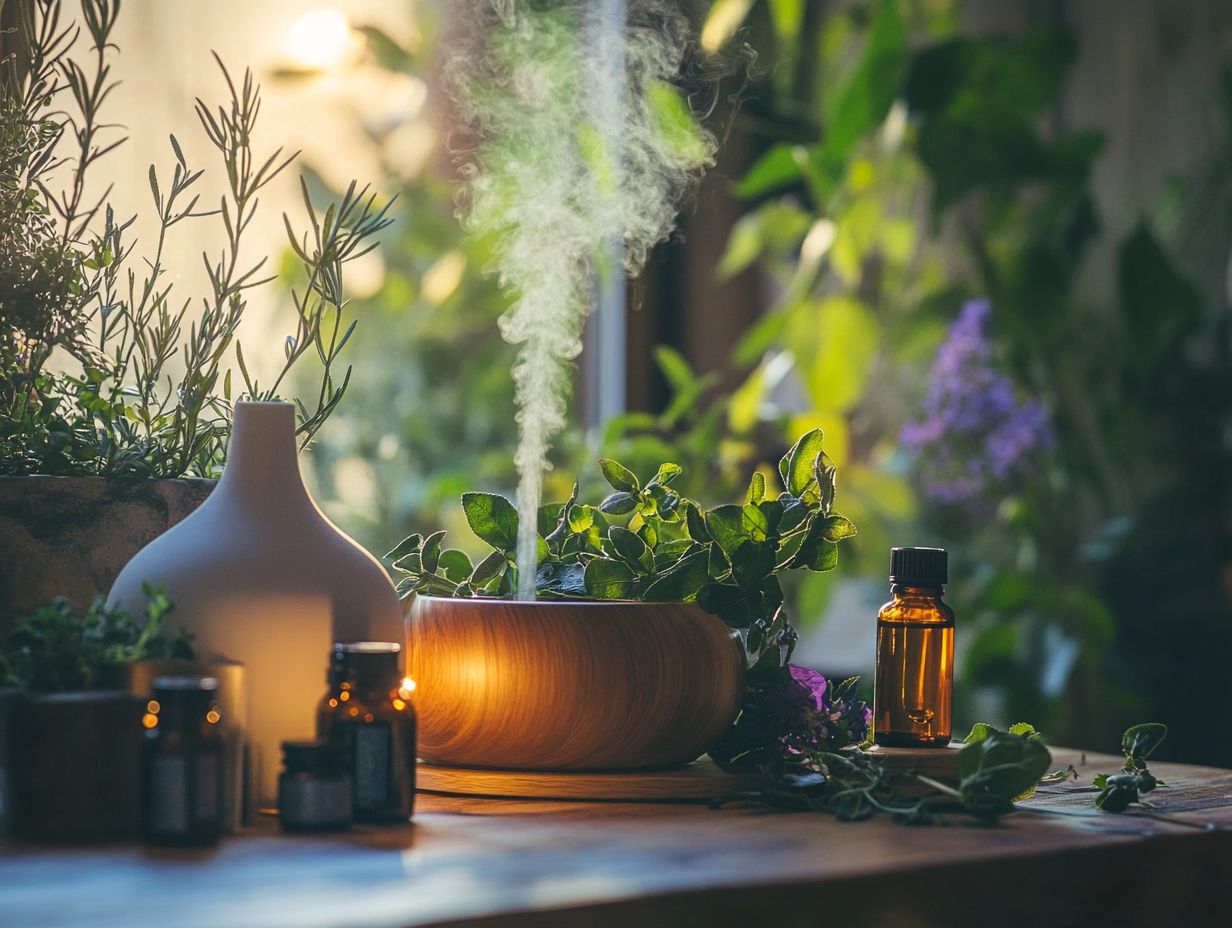
Aromatherapy has a profound impact on your mood and emotions, primarily through the way essential oils interact with your limbic system, which regulates emotions. By using certain oils, you can stimulate serotonin release, enhancing your mood and providing emotional relief a natural antidote to anxiety and depression.
Understanding how these oils work with your brain chemistry helps you appreciate their therapeutic potential. For example, lavender essential oil is known for its calming effects and is used to relieve stress and promote relaxation. Research indicates that it may even reduce cortisol levels, which is an added benefit.
On the other hand, citrus oils like sweet orange can elevate your energy levels and boost your mood thanks to their invigorating scent, making them perfect for warding off feelings of sadness. A case study involving individuals using rosemary oil showed a noteworthy decrease in tension and a significant increase in focus, highlighting the versatile applications of aromatherapy.
Recognizing how these delightful aromas tap into body processes to influence emotions opens new doors for holistic healing and enhances your personal well-being.
Choosing and Using Essential Oils
Selecting the right essential oils for your aromatherapy journey requires a deep understanding of their unique health benefits, application techniques, and safety considerations, especially concerning anxiety relief and stress relief.
With an extensive selection of oils at your disposal, it’s crucial to choose those that resonate with your therapeutic objectives. This thoughtful selection will enhance the effectiveness of your aromatherapy practice, ensuring a truly enriching experience, particularly for those seeking relaxation techniques and mood enhancement.
Factors to Consider
When selecting essential oils, a variety of factors come into play, including your individual health goals, preferred application methods, and personal tastes. Understanding the unique properties of each oil such as those known for relieving anxiety, like lavender essential oil, or improving sleep through breathing techniques is vital for achieving your desired outcomes.
Knowing your health goals will guide your choices. For instance, if boosting your immunity is on your agenda, you might find yourself gravitating towards oils like tea tree, eucalyptus oil, or peppermint oil.
Your sensory preferences also matter greatly. Whether you lean towards floral, citrus, or earthy scents can help you narrow down your options. Thinking about the specific benefits of each oil, such as anti-inflammatory properties, pain management, or mood enhancement, empowers you to make informed decisions.
Start experimenting today! The right essential oil can transform your mood and well-being instantly. Consider starting with a few samples and trying out different applications be it diffusers, topical blends, massage oils, or baths. This hands-on approach will help you discover what resonates most profoundly with your unique needs.
Safety Precautions
Safety precautions are essential when using essential oils, particularly regarding skin application and dilution which means mixing essential oils with a carrier oil to reduce their strength. This helps avoid adverse reactions like allergies or skin irritations, especially for individuals with conditions like Alzheimer s disease.
By understanding the proper methods for application and the significance of patch tests, you can elevate the safety and enjoyment of your aromatherapy experience, ensuring that no chemical compounds trigger sensitivities. It is crucial to consult with a healthcare professional or a certified aromatherapist if you have pre-existing conditions, are pregnant, or dealing with mental health issues.
When utilizing essential oils, it’s vital to adhere to recommended dilution ratios, ensuring that the concentration is safe for topical use, particularly when considering the FDA guidelines. Most guidelines suggest diluting essential oils in a carrier oil, especially for sensitive areas such as the face or when applying them to children.
Remain vigilant about potential allergies, as even the most natural substances can trigger unexpected reactions, such as those related to kidney stones or osteoarthritis. By prioritizing these safety measures, you can confidently explore the myriad benefits of essential oils including their potential for respiratory disinfection while minimizing any risks involved.
Frequently Asked Questions
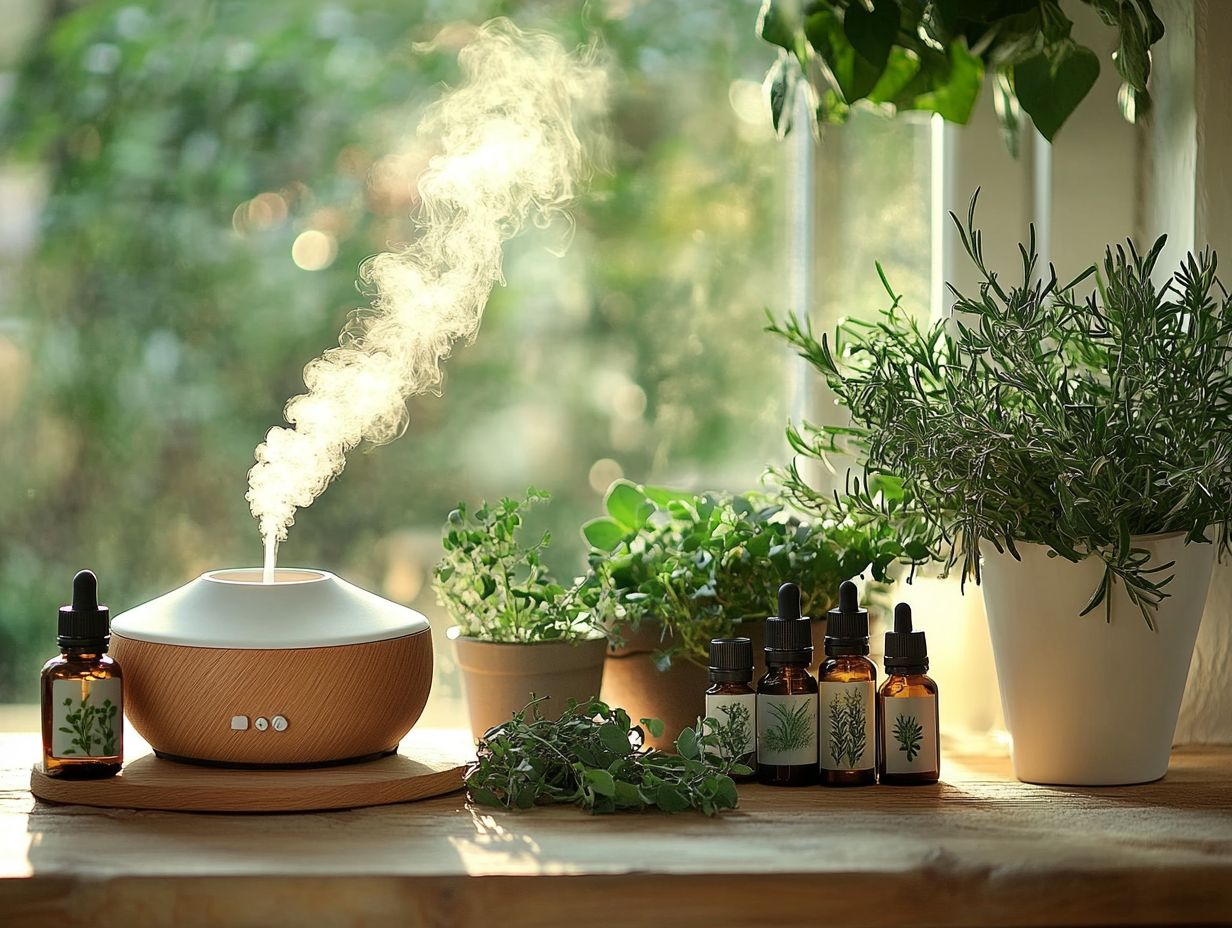
What is Aromatherapy?
Aromatherapy is the use of essential oils to promote physical, mental, and emotional well-being, leveraging the therapeutic benefits of various plant extracts. These concentrated oils are extracted from various plants and herbs and have been used for centuries for their therapeutic properties.
How does Aromatherapy work?
When inhaled or applied topically, the aromatic compounds in essential oils stimulate the olfactory system and trigger responses in the brain, influencing the limbic system and hypothalamus for improved quality of life. This can help calm the nervous system, improve mood through mood enhancement, and provide relief from various ailments, including anxiety and depression.
What are the benefits of Aromatherapy?
- Reduces stress and anxiety through lavender and chamomile
- Improves sleep quality using cedarwood oils
- Boosts immunity
- Relieves pain and inflammation
- Promotes relaxation and overall well-being
How is Aromatherapy used?
Aromatherapy can be used in various ways, including inhalation, topical application, and even ingestion in certain cases, such as using essential oil therapy. Common methods include diffusing essential oils, adding them to bath water or massage oils, and using them in skincare products that leverage their chemical compounds.
Is Aromatherapy safe for everyone?
Aromatherapy is generally considered safe for most people, but it is important to use caution and follow proper dilution guidelines. Even popular oils like lavender or peppermint can cause adverse reactions. Some essential oils may interact with certain medications or cause reactions, especially in those with conditions like osteoarthritis or kidney stones. It’s best to consult with a certified aromatherapist before use.
What are some popular essential oils used in Aromatherapy?
Some popular essential oils include lavender essential oil, peppermint oil, eucalyptus oil, tea tree, and lemon, each offering unique therapeutic benefits. These oils can be used alone or in combination with others for a synergistic effect.
Ready to dive into the benefits of aromatherapy? Start your journey today with our essential oils guide!


